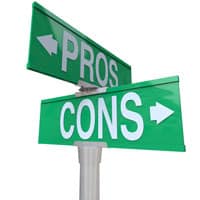 Literary agents pros and cons are important to understand before you try to get published. There are also some important misconceptions surrounding book agents that you need to know about.
Literary agents pros and cons are important to understand before you try to get published. There are also some important misconceptions surrounding book agents that you need to know about.
Read this article to discover the advantages and disadvantages that come with having an author representative, working on your behalf. This article is part of a 9-part series in our Guide to Literary Agents.
* * *
Literary Agents Pros and Cons for Authors
If you want to get a traditional publisher, you really
only have two choices:
- You can get a literary agent who will approach publishers for you
- You can attempt to approach publishers yourself
To help you decide which option is best for you and your book,
let’s take a look at some literary agents pros and cons.
Starting with…
* * *
The Pros
[ezcol_1quarter]
 [/ezcol_1quarter]
[/ezcol_1quarter]
[ezcol_3quarter_end]
Agents Know Exactly Who to Send Your Book To
Book agents are familiar with individual publishers and their lists. Agents are also intimate with the preferences, strengths, and weaknesses of individual editors at publishing houses. That knowledge will allow your agent to submit your book to the perfect editors at the best publishers for you.[/ezcol_3quarter_end]
* * *
[ezcol_1quarter]
 [/ezcol_1quarter][ezcol_3quarter_end]
[/ezcol_1quarter][ezcol_3quarter_end]
More Publishers Will Review Your Book
Most publishers don’t accept unsolicited submissions from authors. That means you’re not allowed to submit your query or manuscript directly to publishers. You need a literary agent to submit your work on your behalf. Although some publishers accept submissions directly from authors, most don’t.[/ezcol_3quarter_end]
* * *
[ezcol_1quarter]
 [/ezcol_1quarter][ezcol_3quarter_end]
[/ezcol_1quarter][ezcol_3quarter_end]
Publishers Will Take Your Work More Seriously
Top agents have access to senior editors and executives, due to the agent’s track record of success. This allows agents to pitch books face-to-face (sometimes with the author present), submit books to publishers simultaneously, hold auctions, and get deals done faster.[/ezcol_3quarter_end]
* * *
[ezcol_1quarter]
 [/ezcol_1quarter][ezcol_3quarter_end]
[/ezcol_1quarter][ezcol_3quarter_end]
You’ll Get Better Contract Terms
Book agents are skilled negotiators who can get you larger advances and higher royalty rates, multi-book deals, bonuses for any awards or special recognition that your book gets, a bigger promotional budget, hardcover and paperback edition commitments, an earlier publication date, etc.[/ezcol_3quarter_end]
* * *
[ezcol_1quarter]
 [/ezcol_1quarter][ezcol_3quarter_end]
[/ezcol_1quarter][ezcol_3quarter_end]
Your Agent Will Troubleshoot Any Problems
Agents handle any challenges that come up during the publication or post-publication process, so you don’t have to. For example: editors that are difficult, fired, laid-off, or retire; title changes or bad book cover design; bad reviews or publicity; poor book sales; changes in the industry or marketplace; etc.[/ezcol_3quarter_end]
* * *
[ezcol_1quarter]
 [/ezcol_1quarter][ezcol_3quarter_end]
[/ezcol_1quarter][ezcol_3quarter_end]
Your Agent Might Bring You Extra Book Ideas & Book Deals
You might not be aware of this, but top book agents often bring their authors ideas for new books. Sometimes those book ideas are something the agent came up with. Other times, those book ideas are something that an editor with a publishing house came up with. There’s never been an easier way to get a book deal.[/ezcol_3quarter_end]
* * *
And now…
* * *
The Cons
[ezcol_1quarter]
 [/ezcol_1quarter][ezcol_3quarter_end]
[/ezcol_1quarter][ezcol_3quarter_end]
Sharing Control
You might not be comfortable having someone (like an agent) speaking on your behalf. But your book agent can serve as a buffer, and deal with challenging situations (see above). That will allow you to maintain a positive and productive relationship with everyone at your publishing house.[/ezcol_3quarter_end]
* * *
[ezcol_1quarter]
 [/ezcol_1quarter][ezcol_3quarter_end]
[/ezcol_1quarter][ezcol_3quarter_end]
Commission
Book agents earn every bit of their 15% agent commission. Most agents will get you at least that much more of an advance, but they’ll also get you better royalties. That means you’ll make more money than you would representing yourself. Plus your agent will manage any crises (see above).[/ezcol_3quarter_end]
* * *
[ezcol_1quarter]
 [/ezcol_1quarter][ezcol_3quarter_end]
[/ezcol_1quarter][ezcol_3quarter_end]
Waiting
One of the most difficult things to do as an author is wait, but you better get used to it. Once you have a literary agency representing you, you’ll have to wait for him to get you a publisher. Then you’ll have to wait for your publisher to publish your book. But I promise you the wait will be worth it.[/ezcol_3quarter_end]
* * *
Conclusion – Literary Agents Pros and Cons
These literary agents pros and cons should make it easy for you to decide on the best way to approach publishers. Take advantage of all the resources on this website to help you get the best book agent possible… so you get a major publisher and a major book deal.

Now, click here to read the next article in this 9-part series and
answer the question: How Does a Literary Agent Work?
* * *
* * *

